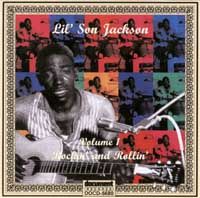Review of Lil' Son Jackson Vol. 1


The following review appeared in Singapura Blue:
Reviewed by Mista Chang
I don't know who the major capo manufacturers were in the late '40s, but if they could have afforded advertising I think the no-brainer for a testimonial would have been Melvin "Lil' Son" Jackson. Jackson lived in Dallas, but you could say he made his second home in first-position key of A (often capoed two or three frets up). Although his best known number, "Rockin' and Rollin'" (subsequently recast as "Rock Me Baby" by B.B. King), is in fact in E, Jackson's signature sound is played "A-style" with a thudding dead-thumb bass.
While his style wasn't as dynamic or idiosyncratic as that of fellow Texan Lightnin' Hopkins, Jackson more than held his own as a down-home solo blues performer. His first recordings, on the Houston-based Gold Star Records (where Hopkins was a labelmate), produced the hit single "Freedom Train Blues" in 1948, and, with a little help from that capo, he churned out more than 60 sides over the next six years. Unlike Hopkins, Jackson had a gentle, nasally singing voice (similar to Slim Harpo), that tended to sweeten the rough-edged riffs coming out of his guitar.
Jackson's music career was short-lived; he quit performing in 1954 after sustaining serious injuries from a car accident, and returned to his old day job as an auto mechanic. In the '60s, Jackson recorded sessions for producers Chris Strachwitz and Roy Ames, but the blues revival's rediscovery machine was never able to latch onto him as it did to his peers Hopkins and Mance Lipscomb. Jackson died in Dallas in 1976.
The bulk of Jackson's pre-1960 recordings were previously available, collectively, on Arhoolie's Texas Blues: The Gold Star Sessions, and Capitol's two-disc anthology The Complete Imperial Recordings of Lil' Son Jackson. (The Capitol set, released in 1995, now appears to be out of print.)
Document's Volume 1: Rockin' and Rollin' (1948-1950) includes the 10 Gold Star masters that Jackson waxed in the late '40s; 2 sides recorded for Modern Records in 1949; and 11 tracks cut for Imperial Records in 1950. All 23 tracks are solo recordings, from the acoustic "Freedom Train Blues" to the heavily amplified "Milford Blues" (which contains the precursor to the "Rockin' and Rollin'" riff).
Jackson's range as a musician was never his strength; indeed, many of the songs on Volume 1 are structurally identical (same guitar intro, same vocal melody, same guitar fills) with slight variations in keys or tempos. Impatient listeners will probably get burned out by track 4 or 5. More discerning listeners -- the kind who, say, can happily obsess over the subtle differences among Elmore James's "Dust My Broom," "Dust My Blues," and "I Believe" -- will find a gold mine here. Likewise, any guitarists who have dabbled with a country blues in A may want to prepare themselves for instant addiction. Jackson's signature "Freedom Train" intro (recycled no less than 14 times on this collection) is every bit as hypnotic as Elmore's "Dust My Broom" lick or Lightnin' Hopkins's "Shotgun Blues" intro.
As a lyricist, Jackson often stuck to subjects that suited the humbleness of his voice: being broke, freight hopping, searching for his two-timing woman (and then leaving her behind). The narrator in his songs is rarely a braggart; instead, he admits his troubles, takes his hard knocks, and sometimes learns a thing or two along the way. Take, for example, the luckless gambler in "Gambling Blues" who regresses into the plodding hobo with rocks in his pillow (and an aching head) in "Homeless Blues." Or, the naive romantic who, after losing his beloved in "True Love Blues," wises up to become (on the flip side, "Ticket Agent Blues") the carefree traveler who tells his woman, "If my mind don't change, I'll be back home someday."
Perhaps due to the intervention of producers, Jackson did record a few numbers that departed from his usual style. These included "Talkin' Boogie" (for Modern), a not-very-chillen attempt at imitating John Lee Hooker, and "Travelin' Alone" (for Imperial), on which Jackson tried a ballad-style vocal that comes across as strained. More successful was "No Money, No Love," which featured an odd III-I-III-I pattern within the song's 12-bar progression; it's easily Jackson's strangest Gold Star side, and a must-listen.
For now, Volume 1: Rockin' and Rollin' stands as the best single-CD survey of Jackson's recordings that you can get. Subsequent volumes of this reissue series should explore more of the guitarist's '50s Imperial sides, in both solo and small-combo settings.
References:
Dahl, Bill. "Lil' Son Jackson," Allmusic.com.
Santelli, Robert. The Big Book of Blues. 2nd ed. New York: Penguin, 2001.
Strachwitz, Chris. Liner notes to Texas Blues: The Gold Star Sessions. Arhoolie, 1992.
Thank you to Mista Chang and Singapura Blue
Click here to buy Lil' Son Jackson Volume 1
Click here to visit Singapura Blue


